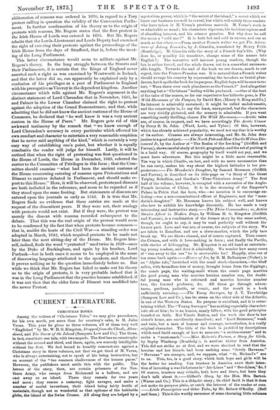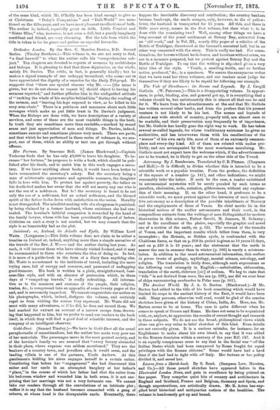CURRENT LITERATURE.
CHRISTMAS BOOKS.
Among the writers of "Christmas Tales," we may give precedence, for his own merit, yet more than for courtesy's sake, to M. Jules Verne. This year he gives us three volumes, all of them very well "Englished " by Mr. W. H. G. Kingston, Dropped from the Clouds, Aban- doned, and The Secret of the Island (Sampson Low and Co.) The three, in fact, constitute one tale, with two sequels. The first has no catastrophe without the second and third, and these, again, are scarcely intelligible without the first. We fool bound to humbly remonstrate against a Christmas story in three volumes, not that we get tired of M. Verne, who is always entertaining, not to speak of his being instructive, but on account of the "too common shallowness of the human purse." However, the publishers must settle this with the public. The heroes of the story, then, are certain prisoners of the Nor- thern Army, who escape from Richmond in a balloon, and are cast away on an island. There they remain for two years and more ; they rescue a castaway, fight savages, and make a number of useful inventions, their island being fairly fertile of materials, though not so wonderful as that epitome of the habitable globe, the island of the Swiss Crusoe. All along they are helped by a mysterious power, which is " the secret of the island," a secret which we know our business too well to reveal, but which will satisfy those readers who have taken in M. Verne's previous marvels. M. Verne's work is as admirable as usual; his characters vigorous, his incident copious and of absorbing interest, and his science genuine. But why does ho call the moon a " cold star?" It is both hot and cold in excess, and one as much as the other.—From another French writer we get The Adven- tures of Johnny fronsides, by J. Girardin, translated by Henry Frith (Routledge). M. Girardin tells the story of a French boy's life. (Why does be, or possibly his translator, change some of the names into English ?) The narrative will interest young readers, though the fun is rather forced, and the whole drawn out to a somewhat unreason- able length. Towards the end of the book we are drawn, much to our regret, into the Franco-Prussian war. It is natural that a French writer should avenge his country by representing the invaders as brutal plun- derers, but it spoils the book for its purpose. English boys will be sure to re- tort, " Were there ever such plunderers as the French ?" And altogether anything but a " Christmas" feeling will be produced. —One of the best of the tales of the season, as far our experience has hitherto gone, is The Wild Horseman of the Pampas, by David Ker, (Henry S. King and Co.) Its interest is admirably sustained ; it might be called melodramatic, and the catastrophe is, to say the least, unexpected, but the characters are very vividly pictured, and the scenery is admirable. If you want something really thrilling, choose The Wild Horseman.—Arctic tales are, of course, in request, and we have accordingly The Arctic Crusoe by Percy B. St. John. (Ward, Lock, and Tyler.) Of this, however, which has already achieved popularity, wo need not say that it is worthy of its author. Crusoes are always interesting, and Mr. St. John does justice to a good subject.—The North Pole and How Charlie Wilson Dis- covered It, by the Author of "The Realm of the Ice-king" (Griffith and Farran), shows careful study of Arctic geography, and the art of putting it in a lucid way. Of course, geography by itself would not pay, and we must have adventure. But this might be a little more reasonable. The way in which Charlie, on foot, and with no more necessaries than he can carry, makes his way about the highest latitudes is too pre- posterous.—The Mandarin's Daughter, by Samnol Mossman (Griffith and Ferran), is described on its title-page as "a Story of the Great Taiping Rebellion, and Gordon's 'Ever-Victorious Army.'" The first half of the volume, however, is occupied with a narration of the Anglo- French invasion of China. It is in the storming of the Emperor's Palace in Pekin that the hero, who—we mention it to encourage en- listing—was a non-commissioned officer of Engineers, met the "man- darin's daughter." Mr. Mossman knows his subject well, and knows also how to exhibit his knowledge discreetly. He has made a very interesting and instructive story.—The Three Commanders ; or, Active Service Afloat in Modern Days, by William H. G. Kingston (Griffith and Ferran), is a combination of the former story by the same author, though, we ought to say, it may be read perfectly well without the former part. Love and war are, of course, the subjects of the story. We are taken to Zanzibar, and see a slave-market, which the jolly tars break up. We see dhows chased, and of course captured. Then comes the Crimea, and with it love-making in force ; and finally the Pacific, with stories of kidnapping. Mr. fingston is an old hand at entertain- ing young readers, and does it admirably. We wonder how many cases of "run away to the sea " he is answerable for ! Happily, nine out of ten come back again.—Rivers of Ice, by R. M. Ballantyne (Nisbet), is an "Alpine tale," furnished with the usual stock-characters,—the bluff sailor, with boundless lots of money, brought home from the diggings ; the comic page, the waiting-maid whom the comic page marries the good young man who marries heroine number one, the doubt- ful young man who is reformed and marries heroine number two, the learned professor, &c. All these go through adven- tures, perilous, pathetic, or comic, and the result is a book sufficiently amusing.—The Young Surveyor, by J. T. Trowbridge (Sampson Low and Co.), has its scene on the other side of the Atlantic, in one of the Western States. Its purpose is exeellent, and it is enter- taining withal. Tho "Young Surveyor" has nothing especially character- istic ab ,ut him; he is an honest, manly fellow, with his good principles founded on faith. But Vinnie Dalton, and the work she does in her sister's home, are excellently described ; and " Lord Betterson;' weak and vain, but a man of honour and courage, nevertheless, is a really original character. The title of the book is justified by descriptions which read lucid enough of how to measure "a section-corner" and to make a "noon-mark."—Mies Roberts's Fortune, a Story for Girls, by Sophy Winthrop (Routledg )), is another visitor from America. This did not strike us at first, and we wore shocked to read that the heroine and her friends had been seeking some "lovely Havanas." " Havanas " are oranges, and, we suppose, what " St. Michael's " are to us. This, too, is a good story, which both boys and girls will be the better for reading. Can trustees in America avow their inten- tion of investing a ward's fortune in "Air-Lines "and " Bee-Linea," &e. ? Of course, trustees may swindle, both here and there, but hero they don't talk about it.—Gilbert's Story, by the Hon. Mrs. Barnes. (Warne and Co.) This is a didactic story ; its chief fault is that it does not make its purpose plain, or catch the interest of the reader at once. —Little Prescription and Other Tales, by Mr. Robert O'Reilly. (Bell and Sons.) This is the worthy successor of some charming little volumes
of the same kind, which Mr. O'Reilly has been kind enough to give us at Christmas. " Daisy's Companions " and " Doll-World " are men- tioned on the title-page, and we have most pleasant recollections of both. The author is, indeed, especially great on dolls. Little Comfort and " Sister Bliss," who, however, is not even a doll, but a purely imaginary confidant and friend, are very charming. But the tale from which the title is taken is for its grace and pathos an especial favourite.



































 Previous page
Previous page